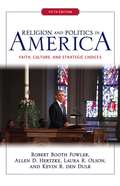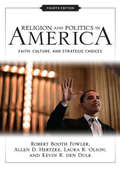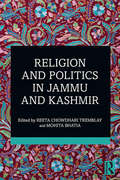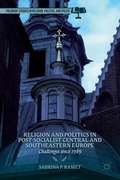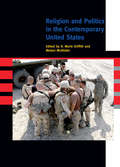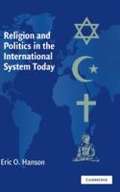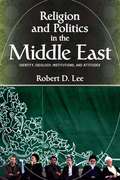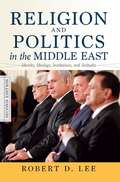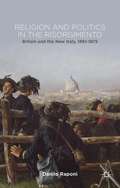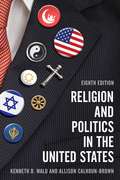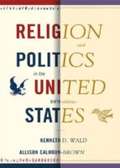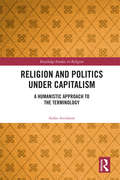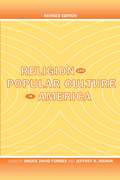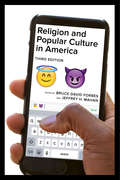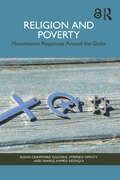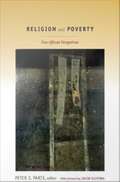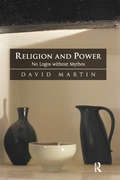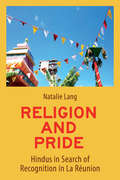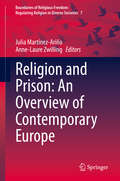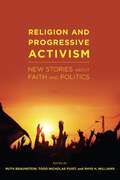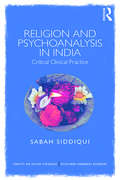- Table View
- List View
Religion and Politics in America
by Kevin R. Den Dulk Laura R. Olson Allen D. Hertzke Robert Booth FowlerReligion and politics are never far from the headlines, but their relationship remains complex and often confusing. In this fifth edition of Religion and Politics in America, the authors offer a lively, accessible, and balanced treatment of religion in American politics. They explore the historical, cultural, and legal contexts that underlie religious political engagement while also highlighting the pragmatic and strategic political realities that religious organizations and people face. Incorporating the best and most up-to-date scholarship, the authors assess the politics of Roman Catholics; evangelical, mainline, and African American Protestants; Jews; Muslims and other conventional and not-so-conventional American religious movements. The author team also examines important subjects concerning religion and its relationship to gender, race/ethnicity, and class. The fifth edition has been revised to include the 2012 elections, in particular Mitt Romney’s candidacy and Mormonism, as well as a fuller assessment of the role of religion in President Obama’s first term. In-depth treatment of core topics, contemporary case studies, and useful focus-study boxes, provides students with a real understanding of how religion and politics relate in practice and makes this fifth edition essential reading for courses in political science, religion, and sociology departments.
Religion and Politics in America
by Laura R. Olson Robert Booth Fowler Allen D. Hertzke Kevin R. Den DulkReligion and politics are never far from the headlines, but their relationship remains complex and often confusing. Religion and Politics in America offers a lively, accessible, and balanced treatment of religion in American politics. The authors explore the historical, cultural, and legal contexts that underlie religious political engagement while also highlighting the pragmatic and strategic political realities that religious organizations and people face today. Incorporating up-to-date scholarship and analysis of voting behavior through the 2008 elections, the fourth edition assesses the politics of conventional and not-so-conventional American religious movements. Features include contemporary case studies, useful focus-study boxes, and timely discussions of Islam, Latinos, international affairs, and political culture.
Religion and Politics in Jammu and Kashmir
by Mohita Bhatia Reeta Chowdhari TremblayThis book examines the shifting, non-linear relationship between religion, nationalism and politics in the state of Jammu and Kashmir, India. In the wake of the revocation of Article 370, the state’s plural and relatively harmonious society has come under multiple strains, with religion often informing day-to-day politics. The chapters in this volume: Trace the formation of the political entity of Jammu and Kashmir and the seemingly secular politics of its three regions Discuss the rise of militancy and resistance movements in the Kashmir Valley Highlight the intersection between everyday life, nationalism and resistance through a study of the literary traditions of Kashmir, contemporary resistance photography and everyday communalism located in the changing food practices of Hindu and Muslim communities Religion and Politics in Jammu and Kashmir will be an indispensable read for students and researchers of religion and politics, democratization and democracy, secularism, sociology, cultural studies and South Asian studies.
Religion and Politics in Post-Socialist Central and Southeastern Europe
by Sabrina P. RametThis volume examines the political engagement of religious associations in the post-socialist countries of Central and Southeastern Europe, with a focus on revelations about the collaboration of clergy with the communist-era secret police, intolerance, and controversies about the inclusion of religious instruction in the schools.
Religion and Politics in the Contemporary United States (A Special Issue of<I> American Quarterly</I> <I> </I>)
by R. Marie Griffith, Melani McAlisterThis collection of essays from a special issue of American Quarterly explores the complex and sometimes contradictory ways that religion matters in contemporary public life.Religion and Politics in the Contemporary United States offers a groundbreaking, cross-disciplinary conversation between scholars in American studies and religious studies. The contributors explore numerous modes through which religious faith has mobilized political action. They utilize a variety of definitions of politics, ranging from lobbying by religious leaders to the political impact of popular culture. Their work includes the political activities of a very diverse group of religious believers: Christians, Jews, Muslims, Hindus, Buddhists, and others. In addition, the book explores the meanings of religion for people who might contest the term—those who are spiritual but not religious, for example, as well as activists who engage symbols of faith and community but who may not necessarily consider themselves members of a specific religion. Several essays also examine the meanings of secular identity, humanist politics, and the complex evocations of civil religion in American life.No other book on religion and politics includes anything like the diversity of religions, ethnicities, and topics that this one does—from Mormon political mobilization to attempts at Americanizing Muslims in the post-9/11 United States, from César Chávez to James Dobson, from interreligious cooperation and conflict over Darfur to the global politics surrounding the category of Hindus and South Asians in the United States.
Religion and Politics in the European Union
by François ForetThis book presents the findings of the first ever survey of the religious preferences of Members of the European Parliament (MEPs). An international research team interviewed a large sample of MEPs, with the purpose of investigating their beliefs and how these beliefs have an impact on their role as MEPs. The findings of this survey are offered in order to discuss, in a non-normative way, some key political and intellectual debates. Is Europe secularized? Is the European Union a Christian club? What is the influence of religious lobbying in Brussels? What are the dynamics of value politics? Contributions also compare MEPs with national MPs and citizens to measure whether the findings are specific to the supranational arena and European multi-level governance. External cases, such as the USA and Israel, are also presented to define whether there is a European exceptionalism regarding the role of religion in the political arena. This book was originally published as a special issue of Religion, State & Society.
Religion and Politics in the International System Today
by Eric O. HansonThis book constructs its new global paradigm by explaining the roles of Christianity, Islam, Judaism, Hinduism, Buddhism, Confucianism, and Maoist Marxism in world politics. This book proposes a post-Cold War paradigm based on the interaction between the contemporary globalization of the political, economic, military, and communication systems and the increasing role of religion in influencing global politics. Rapid technological advances constantly recast politics, economics, armed conflict, and the media. These four systems are thus becoming not just more international each in themselves, but they are also rapidly integrating among themselves. As a result, the four world systems constantly create new environments in which individuals and societies must make rapid choices on the basis of their perceived personal and communal identities.
Religion and Politics in the Middle East
by Robert D. LeeThis innovative book analyzes the interaction of politics and religion in the Middle East through a comparative study of four countries—Egypt, Israel, Turkey, and Iran. Author Robert D. Lee examines each country in terms of four areas in which state and religion necessarily interact: group identity, ideology, institutions, and political culture. He also considers twenty-five commonly encountered (but often contradictory) hypotheses asserting that religion is either an obstacle or an aid to political development, or that religion is largely irrelevant to the development process. The author concludes that politics shapes religion as much or more than religion shapes politics. The nature of religious organization and practice in the Middle East cannot be understood without reference to a national political context.
Religion and Politics in the Middle East
by Robert D. LeeThis innovative book analyzes the relationship between religion and politics in the Middle East through a comparative study of five countries--Egypt, Israel, Turkey, Iran, and Saudi Arabia. Robert D. Lee examines each country in terms of four domains in which state and religion necessarily interact: national identity, ideology, institutions, and political culture. In each domain he considers contradictory hypotheses, some of them asserting that religion is a positive force for political development and others identifying it as an obstacle. Among the questions the book confronts: Is secularization a necessary prerequisite for democratic development? How is it and why is it that religion and politics are so deeply entangled in these five countries? And, why is it that all five countries differ so markedly in the way they identify themselves and use religion for political purposes? The book argues that the nature of religious organization and practice in the Middle East must be understood in the context of individual nation states. The second edition is updated throughout and includes an entirely new chapter discussing the political and religious climate in Saudi Arabia. Earlier introductory analysis has been condensed to make room for new material, and chronologies at the end of each chapter have been added to help students understand the broader context. The second edition of Religion and Politics in the Middle East is a robust addition to courses on the Middle East.
Religion and Politics in the Middle East
by Robert D. LeeThis is a comparative study of the interaction between the religious and political spheres in the Middle East. Lee (political science, Colorado College) examines the relationship in Egypt, Israel, Turkey, and Iran in terms of group identity, ideology, institutions, and political culture. He concludes that, as independent variable, religion has contributed to political development as much as hindered it, but that religion is far more a dependent value that is shaped by the state context within which it operates. Annotation ©2009 Book News, Inc. , Portland, OR (booknews. com)
Religion and Politics in the Middle East
by Robert D. LeeThis innovative book analyzes the interaction of politics and religion in the Middle East through a comparative study of four countries--Egypt, Israel, Turkey, and Iran. Author Robert D. Lee examines each country in terms of four areas in which state and religion necessarily interact: group identity, ideology, institutions, and political culture. He also considers twenty-five commonly encountered (but often contradictory) hypotheses asserting that religion is either an obstacle or an aid to political development, or that religion is largely irrelevant to the development process. The author concludes that politics shapes religion as much or more than religion shapes politics. The nature of religious organization and practice in the Middle East cannot be understood without reference to a national political context.
Religion and Politics in the Risorgimento
by Danilo RaponiThis book examines Anglo-Italian political and cultural relations and analyses the importance of religion in the British 'Orientalist' perception of Italy. It puts religion at the centre of a harsh political and cultural war, one that was fought on international, diplomatic, and domestic levels.
Religion and Politics in the United States
by Kenneth D. Wald ; Allison Calhoun-BrownUsing an evidenced-based, social-scientific approach to religion, Kenneth D. Wald and Allison Calhoun-Brown challenge the perception that religious influence in American politics is a problem to be solved. Instead, they contend that religion is a form of social identification that not only shapes our ideas about politics, but it also shapes the behavior of political elites and ordinary citizens, the interpretation of public laws, and the development of government programs.
Religion And Politics In The United States (6th Edition)
by Kenneth D. Wald Allison Calhoun-BrownReligion and Politics in the United States, Sixth Edition, offers a comprehensive account of the role of religious ideas, institutions and communities in American life. This book examines the ways religion can both compel and constrain involvement in politics and policy. What facilitates political participation? What impedes it? What are the limits of religious mobilization and involvement? Are there benefits? Are there dangers? Religion and Politics in the United States addresses these questions by exploring how religion has influenced the structure of American government and law as well as how religious perspectives inform contemporary political issues including topics such as equal rights for women and gays. The book also explores the ways that religion has affected the orientation of partisan politics in the United States. Through a detailed review of the political attitudes and behaviors of major religious and minority faith traditions, the book establishes that religion continues to be a major part of the American cultural and political milieu while explaining that it must interact with many other factors to impact political outcomes in the United States. The sixth edition reviews the role of religion in the 2008 election and includes coverage of how religion informs the civil rights struggles of women and gay Americans.
Religion and Politics Under Capitalism: A Humanistic Approach to the Terminology (Routledge Studies in Religion)
by Stefan ArvidssonThis book relates some of the major trends within religion and politics to offer a historical framework with which to assess their interactions and a point of departure for studies to come. The study of the interrelationship between contemporary religious practice and modern politics is divided between several scholarly disciplines, all embracing different terminologies as well as multiple theoretical and philosophical premises. Such diversity of perspectives is to be welcomed, but it can inhibit the ability of academics to form a cohesive and coherent dialogue around the subject. While critically assessing the historic, sociological, political, theological and anthropological aspects of religion and politics, the book demonstrates the crucial importance of recognising the capitalist economy as the framework for understanding their dynamic relationship. Moreover, it claims that humanism is the proper lens through which to critically engage with religion in society and must be the favoured point of departure for any study within the field. This book offers a unique overarching viewpoint for of all these divergent scholarly trends and traditions. As such, it will be of significant use to academics in religious studies, political science, sociology and anthropology.
Religion and Popular Culture: A Cultural Studies Approach
by Chris KlassenLooking at the intersection of religion and popular culture through a theoretical lens, this new text offers an insightful treatment of this topical area of study. Each chapter outlines different theories and explores how key ideologies inform and interact with aspects of popular culture, including television, film, music, and the Internet.
Religion and Popular Culture in America
by Jeffrey H. Mahan Bruce David ForbesThe connection between American popular culture and religion is the subject of this multifaceted and innovative collection. In fourteen lively essays whose topics range from the divine feminine in The Da Vinci Code to Madonna's "Like a Prayer," and from the world of sports to the ways in which cyberculture has influenced traditional religions, this book offers fascinating insights into what popular culture reveals about the nature of American religion today. Revised throughout, this new edition features three new essays--including a fascinating look at the role of women in apocalyptic fiction such as the Left Behind series--and editor Bruce David Forbes has written a new introduction. In addition to the new textual material, each chapter concludes with a set of suggested discussion questions.
Religion and Popular Culture in America, Third Edition
by Jeffrey H. Mahan Bruce David ForbesThe connection between popular culture and religion is an enduring part of American life. With seventy-five percent new content, the third edition of this multifaceted and popular collection has been revised and updated throughout to provide greater religious diversity in its topics and address critical developments in the study of religion and popular culture. Ideal for classroom use, this expanded volumegives increased attention to the implications of digital culture and the increasingly interactive quality of popular cultureprovides a framework to help students understand and appreciate the work in diverse fields, methods, and perspectivescontains an updated introduction, discussion questions, and other instructional tools
Religion and Poverty: Monotheistic Responses Around the Globe
by Stephen Offutt Susan Crawford Sullivan Shariq Ahmed SiddiquiThis book offers a timely and compelling look at religion and poverty, focusing primarily on the two largest world religions, Christianity and Islam, and considering religion and poverty in the United States and international contexts.Written by social scientists, the book incorporates relevant theology with a focus on how theology is lived in relation to issues of poverty. Topics include religion as it relates to social service provision, lived religion, philanthropy, faith-based social movements, public policy, and more. This volume synthesizes existing research on religion and poverty and includes new original research.It is an essential resource for upper-level undergraduate or graduate courses focused on religion and poverty and is also an outstanding supplementary text for broader courses in religion, poverty, social welfare, philanthropy, and non-profit organizations.
Religion and Poverty: Pan-African Perspectives
by Peter J. ParisA Ghanaian scholar of religion argues that poverty is a particularly complex subject in traditional African cultures, where holistic worldviews unite life's material and spiritual dimensions. A South African ethicist examines informal economies in Ghana, Jamaica, Kenya, and South Africa, looking at their ideological roots, social organization, and vulnerability to global capital. African American theologians offer ethnographic accounts of empowering religious rituals performed in churches in the United States, Jamaica, and South Africa. This important collection brings together these and other Pan-African perspectives on religion and poverty in Africa and the African diaspora. Contributors from Africa and North America explore poverty's roots and effects, the ways that experiences and understandings of deprivation are shaped by religion, and the capacity and limitations of religion as a means of alleviating poverty. As part of a collaborative project, the contributors visited Ghana, Kenya, and South Africa, as well as Jamaica and the United States. In each location, they met with clergy, scholars, government representatives, and NGO workers, and they examined how religious groups and community organizations address poverty. Their essays complement one another. Some focus on poverty, some on religion, others on their intersection, and still others on social change. A Jamaican scholar of gender studies decries the feminization of poverty, while a Nigerian ethicist and lawyer argues that the protection of human rights must factor into efforts to overcome poverty. A church historian from Togo examines the idea of poverty as a moral virtue and its repercussions in Africa, and a Tanzanian theologian and priest analyzes ujamaa, an African philosophy of community and social change. Taken together, the volume's essays create a discourse of mutual understanding across linguistic, religious, ethnic, and national boundaries. Contributors. Elizabeth Amoah, Kossi A. Ayedze, Barbara Bailey, Katie G. Cannon, Noel Erskine, Dwight N. Hopkins, Simeon O. Ilesanmi, Laurenti Magesa, Madipoane Masenya, Takatso A. Mofokeng, Esther M. Mombo, Nyambura J. Njoroge, Jacob Olupona, Peter J. Paris, Anthony B. Pinn, Linda E. Thomas, Lewin L. Williams
Religion and Power: No Logos without Mythos
by David MartinThere are few more contentious issues than the relation of faith to power or the suggestion that religion is irrational compared with politics and peculiarly prone to violence. The former claim is associated with Juergen Habermas and the latter with Richard Dawkins. In this book David Martin argues, against Habermas, that religion and politics share a common mythic basis and that it is misleading to contrast the rationality of politics with the irrationality of religion. In contrast to Richard Dawkins (and New Atheists generally), Martin argues that the approach taken is brazenly unscientific and that the proclivity to violence is a shared feature of religion, nationalism and political ideology alike rooted in the demands of power and social solidarity. The book concludes by considering the changing ecology of faith and power at both centre and periphery in monuments, places and spaces.
Religion and Pride: Hindus in Search of Recognition in La Réunion
by Natalie LangSeeking recognition presents an important driving force in the making of religious minorities, as is shown in this study that examines current debates on religion, globalization, diaspora, and secularism through the lens of Hindus living in the French overseas department of La Réunion. Through the examination of religious practices and public performance, the author offers a compelling study of how the Hindus of the island assert pride in their religion as a means of gaining recognition, self-esteem, and social status.
Religion and Prison: An Overview of Contemporary Europe (Boundaries of Religious Freedom: Regulating Religion in Diverse Societies #7)
by Julia Martínez-Ariño Anne-Laure ZwillingThis volume offers a European overview of the management of religious diversity in prisons and provides readers with rich empirical material and a comparative perspective. The chapters combine both legal and sociological approaches. Coverage for each country includes historical background, current penitentiary organization, and recent changes or trends. In their exploration of legal aspects, the contributors look at such factors as the status of prison chaplains and regulations concerning religious practice and religious freedom. These include meals, prayers, and visits. The sociological analysis examines religious discrimination in prison, church-prison relations, conversion and proselytism, and more. The European coverage includes countries for which such information is seldom available. The book offers readers a better understanding of governance of religion in prisons. This text appeals to students, researchers and professionals in the field.
Religion and Progressive Activism: New Stories About Faith and Politics (Religion and Social Transformation #6)
by Edited by Ruth Braunstein, Todd Nicholas Fuist, and Rhys H. WilliamsNew stories about religiously motivated progressive activism challenge common understandings of the American political landscape.To many mainstream-media saturated Americans, the terms “progressive” and “religious” may not seem to go hand-in-hand. As religion is usually tied to conservatism, an important way in which religion and politics intersect is being overlooked. Religion and Progressive Activism focuses on this significant intersection, revealing that progressive religious activists are a driving force in American public life, involved in almost every political issue or area of public concern. This volume brings together leading experts who dissect and analyze the inner worlds and public strategies of progressive religious activists from the local to the transnational level. It provides insight into documented trends, reviews overlooked case studies, and assesses the varied ways in which progressive religion forces us to deconstruct common political binaries such as right/left and progress/tradition. In a coherent and accessible way, this book engages and rethinks long accepted theories of religion, of social movements, and of the role of faith in democratic politics and civic life. Moreover, by challenging common perceptions of religiously motivated activism, it offers a more grounded and nuanced understanding of religion and the American political landscape.
Religion and Psychoanalysis in India: Critical Clinical Practice (Concepts for Critical Psychology)
by Sabah SiddiquiReligion and Psychoanalysis in India questions the assumptions of an established scientific, evidence-based global mental health paradigm by examining the practices of faith-based healing. It proposes that human beings demonstrate a dual loyalty: to science as faith and faith as science, both of which get reconfigured in the process. In this particular context, science and faith are deployed in ways that are not only different but at times contrary to mainstream discourses of science and religion, and faith healing becomes a point where these two discourses collide head-on in negotiating cultural values and practices. The book addresses key questions, such as: What is the value of 'faith healing' in understanding distress and treatment in different cultural contexts? What is a critical psychological perspective on faith and religious systems? What challenges do alternative religious practices pose to critical psychology? How should we re-imagine clinical work in a context marked by science and religion? Situated between 'West' and 'East', between the global mental health movement and local faith-based practices in India, the book addresses a wide audience that includes students and researchers in psychology, cultural and medical anthropology, the sociology of religion, cultural theory, postcolonial theory, and the sociology of science. It will also appeal to policy-makers and practitioners interested in the work of NGOs and the legal frameworks driving mental health movements in India.
